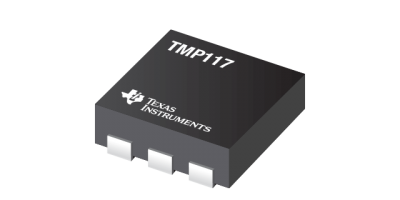Digital temperature sensors simplify medical designs
Single-chip digital temperature sensors help engineers reduce design complexity, says Texas Instruments.
The TMP117 is the first single-chip temperature sensor to offer performance similar to platinum resistance temperature detectors (RTDs) while significantly reducing design complexity and power consumption, claims the company.
The TMP117M is a version of the digital temperature sensor for medical applications; it supports requirements for medical thermometers. The sensors enable engineers to more quickly develop highly accurate, ultra-low-power patient monitoring, field transmitter and metering applications.
Delivering ±0.1 degree C accuracy across a wide range, with zero calibration during manufacturing, the sensor family can save design time and reduce production costs for systems requiring high accuracy, says Texas Instruments.
For medical applications, the TMP117M provides ± 0.1 degree C accuracy from 30 to 45 degreeC and supports American Society for Testing and Materials (ASTM) E1112 and International Organization for Standardization (ISO) 80601 requirements for patient thermometers.
The TMP117 provides a direct readout of temperature, with no additional linearisation or acquisition error, and maintains accurate temperature over a wide range pf ±0.1 degree C from -20 to +50 degrees C, ±0.15 degree C from -40 to +50 degrees C, ±0.2 degree C from -40 to +100 degrees C.; ±0.25 degree C from -55 to +125 degrees C and ±0.3 degree C from -55 to +150 degrees C.
Using the TMP117, engineers can gain the accuracy required for an application without the design and manufacturing complexity of typical solutions, says TI. Comparatively, to achieve a similar level of accuracy with a platinum RTD, engineers must select a multitude of precision components, simulate and fine-tune the circuit, carefully lay out the PCB to avoid impedance mismatches, develop software to linearize the output and calibrate each system.
Both the TMP117 and TMP117M are I2C- and SMBus-interface compatible and provide a direct digital readout of the temperature, which significantly reduces design, layout and simulation time, and speeds time to market.
Using only 6.3 microW, the TMP117 and TMP117M enable engineers to achieve longer battery life and more accurate temperature measurement in their designs. They use less power too. The TMP117 consumes up to 95 per cent less power than a typical RTD measurement system, says TI, enabling designers to meet tight power budgets in field transmitters or battery-powered applications. In addition, the low-power consumption of the TMP117 and TMP117M minimises the impact of self-heating, enabling more accurate temperature measurement.
Both devices will be available in six-pin WSON no-lead packaging. An evaluation board, the TMP117EVM is also available.




